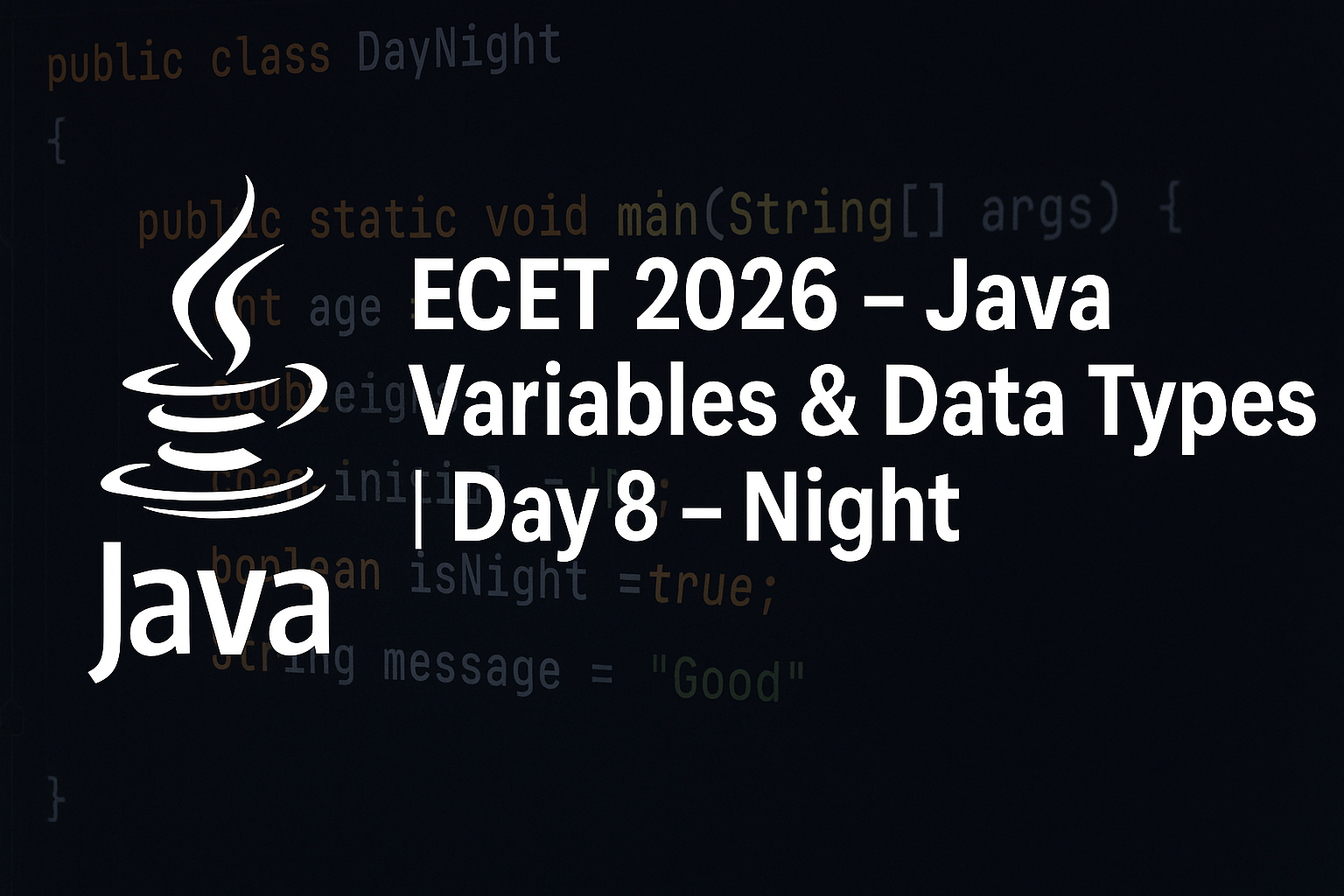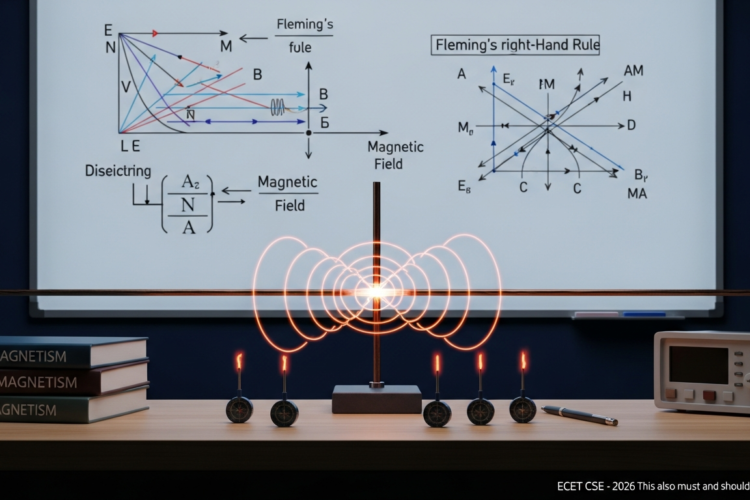
In the ECET 2026 exam, Java holds significant weight in the CSE technical paper, especially under the new C-23 curriculum. One of the most tested and fundamental topics is Variables and Data Types in Java. Mastering this concept helps you understand how Java stores and processes data efficiently — and boosts your performance in objective questions. Let’s explore the concept, followed by 10 MCQs, answers, and explanations.
📘 Concept Notes – Java Variables & Data Types
🔤 Variables in Java:
A variable in Java is a container that holds a value during the execution of a program. Each variable must be declared with a data type.
✍️ Variable Declaration Example:
int age = 20;
float price = 99.5f;
String name = "Ravi";📚 Types of Variables:
- Local Variables – Declared inside a method/block.
- Instance Variables – Declared inside a class but outside methods.
- Static Variables – Declared with the
statickeyword; shared among all objects.
🧮 Java Data Types:
🔹 Primitive Data Types (8 total):
| Data Type | Size | Example | Description |
|---|---|---|---|
| byte | 1 byte | 127 | Whole numbers (small) |
| short | 2 bytes | 32,000 | Whole numbers (medium) |
| int | 4 bytes | 100000 | Default for integers |
| long | 8 bytes | 1L | Large integers |
| float | 4 bytes | 10.5f | Decimal (single precision) |
| double | 8 bytes | 20.99 | Decimal (double precision) |
| char | 2 bytes | ‘A’ | Single character |
| boolean | 1 bit | true/false | True or False |
🔸 Non-Primitive (Reference) Types:
- String, Arrays, Objects – Store multiple values or structured data.
💡 Key Points to Remember:
- Variable names must start with a letter,
$, or_. - Data types define the kind of data a variable can store.
- Java is statically typed, meaning variables must have declared types.
- Use
floatwithf(e.g.,10.5f) andlongwithL.
🔟 10 Most Expected MCQs – ECET 2026 [Java Variables & Data Types]
Q1. Which of the following is a valid Java variable name?
A) 1num
B) num@val
C) _value
D) int
Q2. What is the default data type for integer values in Java?
A) long
B) short
C) byte
D) int
Q3. Which data type is used to store true/false values?
A) int
B) boolean
C) char
D) float
Q4. How many primitive data types are there in Java?
A) 6
B) 7
C) 8
D) 9
Q5. What is the size of a float in Java?
A) 2 bytes
B) 4 bytes
C) 8 bytes
D) 16 bytes
Q6. Which of these is not a primitive data type?
A) byte
B) String
C) double
D) char
Q7. What is the correct way to declare a long variable?
A) long a = 10;
B) long a = 10L;
C) long a = “10”;
D) long a = 10.0;
Q8. Which keyword is used to declare a constant variable?
A) const
B) final
C) static
D) define
Q9. Which data type should be used to store a single character?
A) String
B) int
C) char
D) bool
Q10. What is the output of:
System.out.println(10 > 5); A) true
B) false
C) 10 > 5
D) Error
✅ Answer Key Table
| Q.No | Answer |
|---|---|
| Q1 | C |
| Q2 | D |
| Q3 | B |
| Q4 | C |
| Q5 | B |
| Q6 | B |
| Q7 | B |
| Q8 | B |
| Q9 | C |
| Q10 | A |
🧠 Explanations of All Answers
- Q1 → C:
_valueis valid; Java variables can’t start with numbers or use symbols like@. - Q2 → D: Default integer type in Java is
int. - Q3 → B: Boolean is used for true/false values.
- Q4 → C: Java has 8 primitive types.
- Q5 → B:
floattakes 4 bytes of memory. - Q6 → B:
Stringis a non-primitive data type. - Q7 → B: Use
Lsuffix for long literals. - Q8 → B:
finalis used to declare constants. - Q9 → C: Single characters are stored in
char. - Q10 → A: 10 > 5 is true, so it prints
true.
🎯 Why This Practice Matters for ECET 2026
Java is an essential subject in ECET 2026 CSE, and questions on variables and data types are common and scoring. By practicing with structured MCQs and reviewing answers, students can solidify fundamentals, reduce silly mistakes, and secure easy technical marks.
📲 Join Our ECET Prep Community on Telegram
Looking for daily MCQs, study notes, and ECET discussions?
👉 @LearnNewThingsHub – Your ECET 2026 learning group.



